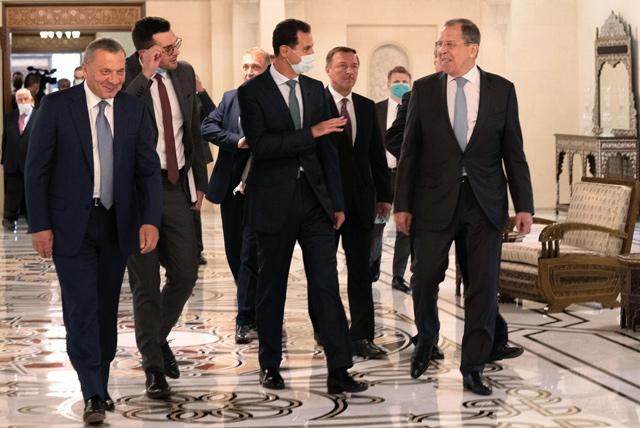- International News
- Tue-2020-09-08 | 03:19 pm

Syria and a Russian delegation on Monday discussed economic cooperation to help counter Western sanctions on Syria, during Foreign Minister Sergei Lavrov's first visit to the war-torn country since 2012.
Russia has been a key ally of the Damascus government since the start of the country's war in 2011, providing critical military backing and signing several major economic deals.
Meeting a Russian delegation headed by Lavrov, President Bashar Assad said "the Syrian government was determined to continue working with Russian partners", to implement signed agreements and encourage the "success of Russian investments in Syria", the presidency said.
They discussed possible new agreements "in the interest of both countries and to alleviate the impact of a policy of sanctions" by Western countries against government-held areas of Syria, it added in a statement.
The Russian visit comes as Damascus struggles to redress a war-battered economy, further hindered by Western sanctions including under the US Caesar Act, implemented since mid-June.
Damascus and Moscow have signed several deals in recent years in energy, construction and agriculture.
They include one for Russian firm Stroytransgaz to take over Syria's largest port of Tartous for 49 years.
Another deal awarded the same company a 50-year concession to extract phosphate in the central region of Palmyra.
Russian Deputy Prime Minister Yury Borisov told reporters that a new economic and trade deal was in the works, which he hoped could be signed during another trip to Syria in December.
'Economic blockade'
The proposed accord, now under review by Damascus, includes around 40 projects, Borisov said, including the rehabilitation of power plants and hydrocarbon exploration in Syrian waters in the Mediterranean.
"Syria's economic isolation" with Western sanctions were hampering foreign investment, Borisov said.
"It's an economic blockade that we are trying to break through our common efforts," he added.
President Vladimir Putin made his first trip to Damascus in Syria's nine-year-old war in January, after a previous visit to the Russian base of Hmeimim on the Mediterranean coast in 2017.
Moscow's military intervention in 2015 helped turn the tide of the war, with Russian air power allowing Syrian government forces to win back large parts of the country from rebels and jihadists.
With UN-led peace talks floundering in recent years, Moscow and rebel backer Turkey have emerged as the main powerbrokers in alternative negotiations.
A UN-backed committee is supposed to be discussing Syria's post-war constitution.
Syrian Foreign Minister Walid Muallem told a press conference they "would decide if they want to amend the current constitution or produce a new one".
"In both cases, the result will be submitted to a referendum," he said.
After Syria, Lavrov was due to head to nearby Cyprus.
Syria's conflict has ravaged the country's economy, killed more than 380,000 people and displaced millions since it erupted in 2011 with the repression of anti-government protests.













